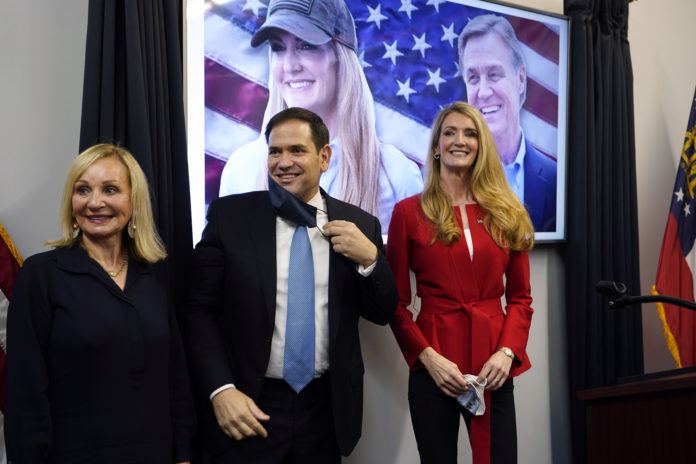
Socialists. Radical extremists. Marxists.
Those over-the-top caricatures of Democrats make up Republicans’ opening arguments as they try to protect Georgia’s two U.S. senators who face strong challenges in Jan. 5 runoffs that’ll determine which party controls the chamber at the start of President-elect Joe Biden’s Democratic administration.
Florida Sen. Marco Rubio led the charge Wednesday, campaigning in suburban Atlanta alongside Sen. Kelly Loeffler and warning that defeats for her and fellow Georgia Sen. David Perdue would hand over the U.S. government to “radical elements.”
Loeffler went so far as to assert, without supporting details, that her Democratic challenger Raphael Warnock has “a Marxist ideology.” Loeffler took no questions after the event that filled the Cobb County Republican Party headquarters with hundreds of enthusiastic voters, many of them not wearing masks as coronavirus cases spike across the country.
Warnock’s campaign pushed back, noting the Democrat’s policy preferences fall squarely within the U.S. political mainstream. Terrence Clark, a Warnock aide, said Loeffler is trying to “scare Georgians” while “misrepresenting” Warnock’s candidacy and obscuring her own record.
It’s a familiar trope for Republicans to blast Democrats, especially in traditionally GOP-leaning states, as “too liberal” or even “socialist.” But the vehemence to open a two-month runoff blitz underscores the national stakes of Georgia’s unusual twin Senate contests and the sharp focus Republicans are putting on energizing core supporters for a second round of voting.
The arguments come as Loeffler, Perdue, and other Georgia Republicans continue suggesting the Nov. 3 election — overseen by a Republican secretary of state — was rife with voting irregularities and tabulation errors, assertions made without evidence but that animate a GOP base still loyal to President Donald Trump even after his national defeat.
“Turnout takes care of itself when the presidential race is on the ballot, so it can still boil down to persuasion in the middle,” said Republican consultant Chip Lake, a top adviser on Rep. Doug Collins’ unsuccessful bid against Loeffler.
“In a runoff, it’s no longer about persuasion” Lake continued. “It’s about the bases.”
Collins, now leading Trump’s recount efforts in Georgia, said the goal is to keep Republicans “fired up because they don’t want to see our country turn to a liberal perspective.”
Republicans and Democrats are bracing for an unprecedented national-scale campaign in Georgia, a newfound two-party battleground where record turnout of roughly 5 million split almost evenly. Biden leads Trump by about 14,000 votes, but Secretary of State Brad Raffensperger announced plans Wednesday for an audit with a hand tally of ballots before certifying the results.
Perdue, a staunch Trump ally first elected in 2014, led Democrat Jon Ossoff but fell short of the majority Georgia law requires for victory. Loeffler, appointed after Republican Sen. Johnny Isakson announced his retirement last year, trailed Warnock in an all-party primary to finish out the final two years of a six-year term.
The Associated Press has called runoffs in both contests but hasn’t called Georgia’s 16 presidential electoral votes.
Nationally, Republicans have secured 50 Senate seats to Democrats’ 48. Still, the GOP needs at least one of the Georgia seats to command a majority in January. In a 50-50 Senate, Democrats would have the tie-breaking vote in Vice President-elect Kamala Harris.
Rubio and Loeffler warned of dire consequences, even as Rubio implicitly conceded the hyperbole.
“To be fair, not all Democrats are socialists,” Rubio said. “But all socialists are Democrats.”
Rubio alluded to failed presidential candidate Bernie Sanders, an independent who calls himself a democratic socialist and caucuses with Senate Democrats. Rubio nodded to progressive calls to “defund the police” and Democrats who support policies like “Medicare for All” single-payer health insurance or tuition-free public college nationwide.
“All the energy” and “all the money” in the Democratic Party, Rubio insisted, come from such forces. Rubio didn’t mention Biden, who won the nomination and presidency as an establishment figure promising bipartisanship and compromise.
Biden often noted as he campaigned that he defeated Sanders and other more liberal candidates for the nomination. “He thinks he’s running against someone else,” Biden quipped at Trump during an Oct. 22 debate when the president sought to label his challenger a socialist.
Biden, for example, supports adding a “public option” government health care plan to existing insurance markets, but without ending private insurance. He backs significant public spending on green energy but opposes progressives’ push for quickly phasing out fossil fuels.
Warnock and Ossoff have largely aligned behind Biden’s agenda, especially on a public option.
Clark, Warnock’s spokesman, noted that Loeffler backs GOP efforts to roll back the 2010 Affordable Care Act that bars insurers from discriminating against customers based on their health history. He also saddled her with the GOP-run Senate’s failure to pass another coronavirus economic aid package as millions of Americans face the loss of jobless benefits, foreclosures, and evictions.
Republicans nonetheless are doubling down after GOP Senate incumbents defeated well-financed challengers in more conservative states such as Iowa, Texas, and Montana, while Republican challengers knocked off several House Democrats who’d won moderate districts in 2018. Their bet is that Georgia, long a GOP stronghold before Biden’s performance in the presidential race, follows the same path.
Republished with the permission of the Associated Press.












